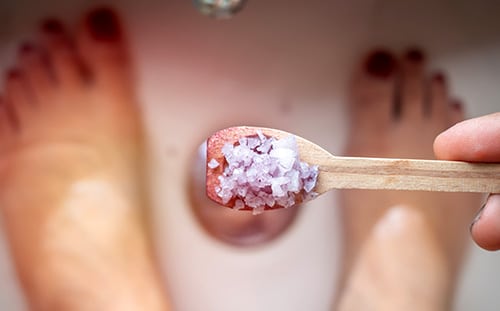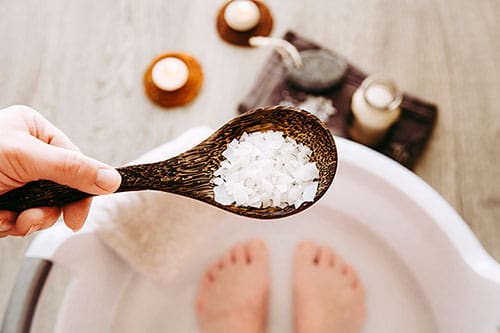 Epsom salt baths feel divine when you’re pregnant! This natural remedy for aches and pains is completely safe for pregnant women. You use Epsom salt by putting it into your bathwater and then taking a long, luxurious bath. Many athletes swear by Epsom salt baths for soothing tired muscles after a hard workout.
Epsom salt baths feel divine when you’re pregnant! This natural remedy for aches and pains is completely safe for pregnant women. You use Epsom salt by putting it into your bathwater and then taking a long, luxurious bath. Many athletes swear by Epsom salt baths for soothing tired muscles after a hard workout.
Join us as we share safety tips, answer frequently asked questions, and share a few ways in which Epsom salt baths during pregnancy can help you sail through your pregnancy with ease!
Pregnant women can easily use Epsom salt while soaking in a tub or footbath. Since it dissolves easily and instantly, using it in baths is the best way to use it as it relaxes sore muscles.
To reap the benefits, put around two cups of Epsom salt into a warm bath. Soak in the tub for 12 to 15 minutes. It’s best if you can make sure that the water temp is comfortable but not hot. That’s because it’s dangerous to raise your body temperature too much when you’re pregnant. This is why you should also avoid hot tubs during pregnancy.
There are many advantages to taking Epsom salt baths during pregnancy. These are the top five benefits:
1. Diminish stress
Soaking in a warm bath is a great way to help to relieve stress. When you’re pregnant, your hormone levels are constantly changing as your body adjusts to supply nutrition to your baby. This can cause mood swings, which aren’t great for you or your baby.
Research suggests that the magnesium in Epsom salt may also be a natural stress reducer and anti-depressant. Bathing with Epsom salt can improve your mood and make you feel lighter.
Many pregnant women look forward to their nightly Epsom salt bath after a long day on their feet. What a soothing way to relax and calm your soul!
2. Relaxes muscles
An Epsom salt bath does wonders at easing sore muscles and back pain! And it’s also recommended to treat leg cramps, a common issue during pregnancy. It provides much-needed relief for you.
3. Soothes skin
During your pregnancy, your skin will stretch to accommodate the growing baby in your belly. Bathing with Epsom salt can soothe and exfoliate your skin, relieving the stretches and improving its appearance.
Many pregnant women find as their skin stretches to make room for their baby, it makes their tummy and joints very itchy. An Epsom salt bath can relieve this miserable itching.
4. Reduces swelling
Taking an Epsom salt bath while you’re pregnant is one of the best ways to reduce inflammation! When you take an Epsom salt bath, the magnesium sulfate in the salt is absorbed into your skin. This magnesium will get in the way of your pain receptors in the brain, decreasing any pain you’re feeling. Epsom salts are a natural, anti-inflammatory pain reliever.
As Epsom salt is anti-inflammatory, the magnesium sulfate it contains will increase your blood circulation and decrease any pregnancy-related swelling in your body. Many pregnant women find that their feet swell up a lot during pregnancy. An Epsom salt foot soak feels great and will help you with swelling and discomfort!
5. Helps with hemorrhoids
OK, so no one wants to talk about it, but pregnant women are more likely to get hemorrhoids. Take a soak in a warm bath with Epsom salts, and its anti-inflammatory nature can help decrease your hemorrhoids. Epsom salt increases water in the intestine, helping to clean any fecal matter present.
Epsom salt baths also reduce bloating, which is common in pregnant women.
Are Epsom Salt Baths Safe During Pregnancy?
Doctors and researchers generally agree that Epsom salt baths are a safe way to seek relief, as long as women take proper precautions. Some research suggests that the magnesium sulfate in Epsom salt will absorb into the skin. This is why many suggest using Epsom in a bath.
In general, using Epsom salt in your bath is safe. But it never hurts to check in with your doctor before including it in your bath time routine.
Epsom salts can increase the temperature of the water, so it’s important to be cautious. When you initially turn your bath faucet on, keep the water temperature down. Also, it helps to double-check your water temp using a baby thermometer.
Safety & Precautions for Epsom Salt Baths During Pregnancy
The ideal water temperature for your Epsom salt bath should be between 98-100°F (37-38°C) – warm enough to be relaxing but not hot enough to raise your core body temperature.
Use a reliable bath thermometer to check the temperature before getting in, as pregnancy can affect your ability to judge water temperature by touch accurately.
Never exceed 102°F (39°C), as overheating during pregnancy can be dangerous for both you and your baby. Hot water can cause your blood pressure to drop suddenly, leading to dizziness or fainting.
Frequency and Duration Recommendations
- How Often: Epsom salt baths are safe for daily use during pregnancy, but most experts recommend 3-4 times per week to start
- Duration: Limit your soak to 12-15 minutes maximum to prevent overheating and skin irritation
- Amount: Use 1-2 cups of Epsom salt per standard bathtub (adjust proportionally for smaller tubs)
Warning Signs to Watch For
Exit the bath immediately and contact your doctor if you experience:
- Dizziness or lightheadedness
- Nausea or vomiting
- Rapid heartbeat
- Difficulty breathing
- Excessive sweating
- Skin irritation or rash
- Any unusual discomfort
Recommendations by Trimester
First Trimester (Weeks 1-12)
- Be extra cautious with water temperature as your body is still adjusting to pregnancy
- Morning sickness may make baths less appealing, but they can actually help with nausea
- Start with shorter soaks (10 minutes) to see how your body responds
Second Trimester (Weeks 13-27)
- Generally the safest time for regular Epsom salt baths
- Your energy levels are higher, making it easier to enjoy longer soaks
- Great time to establish a relaxing bath routine
Third Trimester (Weeks 28-40)
- Use extra caution getting in and out of the tub due to balance changes
- Consider using a bath mat and grab bars for safety
- You may need help getting up from the tub
- Avoid very full baths as your belly makes positioning more challenging
When NOT to Use Epsom Salt Baths
Avoid taking an Epsom salt bath if you have:
- Open wounds, cuts, or severe skin conditions
- Active vaginal bleeding
- Ruptured membranes (water breaking)
- Preterm labor symptoms
- Severe pregnancy complications (as advised by your doctor)
Consult Your Doctor First If You Have:
- High-risk pregnancy conditions
- Heart conditions or blood pressure issues
- Kidney problems
- Diabetes (gestational or pre-existing)
- Skin sensitivities or eczema
- History of preterm labor
Additional Safety Tips
- Never leave the bathroom door locked when bathing alone
- Keep a phone nearby in case you need help
- Have someone check on you if you’re soaking for the full 15 minutes
- Stay hydrated – keep a water bottle nearby
- Get up slowly from the bath to prevent dizziness
- Use non-slip mats in and around the tub
Frequently Asked Questions About Epsom Salt Baths During Pregnancy
Can I use Epsom salt baths if I have gestational diabetes?
Generally, yes, but you should consult your doctor first. Gestational diabetes doesn’t typically prevent Epsom salt bath use, but your doctor may want to monitor how the relaxation affects your blood sugar levels. The magnesium in Epsom salt may actually help with blood sugar regulation, but make sure to discuss this with your medical team first.
What if I have sensitive skin or eczema?
Start with a smaller amount of Epsom salt (1/2 cup instead of 2 cups) and shorter soak times (5-7 minutes). Test a small area first by dissolving a pinch of Epsom salt in warm water and applying it to your inner wrist. If you experience any irritation, discontinue use. Consider unscented, pure magnesium sulfate products without additives.
Is it safe to use Epsom salt baths during all trimesters?
Yes, Epsom salt baths are generally safe throughout pregnancy when used properly. However, first trimester requires extra caution due to increased nausea sensitivity, and third trimester needs additional safety measures due to mobility changes. Always follow the temperature and duration guidelines regardless of trimester.
Can I use Epsom salt baths if I’m on bed rest?
It depends on your specific bed rest restrictions. Some forms of bed rest allow for brief baths with assistance, while others require complete immobility. Always check with your healthcare provider first. If baths aren’t allowed, consider Epsom salt foot soaks as an alternative, which may be permitted depending on your restrictions.
How do Epsom salt baths interact with prenatal vitamins?
There are no known negative interactions between Epsom salt baths and prenatal vitamins. In fact, the magnesium absorbed through your skin may complement the magnesium in your prenatal vitamin. However, don’t use Epsom salt baths as a replacement for your prenatal vitamins – they serve different purposes and both are important for your health.
Can I add essential oils to my Epsom salt bath while pregnant?
Be extremely cautious with essential oils during pregnancy, as many are not safe for expecting mothers. Oils to avoid include rosemary, sage, jasmine, juniper, and many others.
If you want fragrance, stick to pregnancy-safe options like lavender (in small amounts) or chamomile, but it’s safest to use pure, unscented Epsom salt. Always consult your healthcare provider before adding any essential oils.
What if the Epsom salt isn’t dissolving completely?
This usually happens when the water isn’t warm enough or you’re using too much salt. Try adding the Epsom salt while the water is running to help it dissolve better. You can also dissolve it in a cup of hot water first, then add it to your bath. Undissolved crystals can be irritating to sensitive pregnancy skin.
Can I use Epsom salt baths if I have high blood pressure?
Warm baths can actually help lower blood pressure temporarily, which might be beneficial. However, if you have pregnancy-induced hypertension or chronic high blood pressure, you should get clearance from your doctor first. The relaxation benefits may be helpful, but medical supervision is important.
Is it normal to feel tired after an Epsom salt bath?
Yes, feeling relaxed and slightly tired after a warm Epsom salt bath is completely normal and often desired! Magnesium has muscle-relaxing properties, and the warm water increases circulation, both of which can make you feel drowsy. This makes evening baths perfect for better sleep. However, if you feel weak, dizzy, or unwell, this could indicate the water was too hot or you soaked too long.
Can I take Epsom salt baths if I’m breastfeeding after delivery?
Absolutely! Epsom salt baths are safe and beneficial during breastfeeding. They can help with postpartum recovery, especially if you had a vaginal delivery or are dealing with hemorrhoids. The magnesium won’t negatively affect your breast milk. In fact, many postpartum care providers recommend sitz baths with Epsom salt for healing.
What’s the difference between Epsom salt and regular table salt for baths?
Epsom salt (magnesium sulfate) is completely different from table salt (sodium chloride). Epsom salt dissolves easily in water and has therapeutic properties due to its magnesium content. Table salt can be irritating to the skin and doesn’t provide the same muscle-relaxing benefits. Never substitute table salt for Epsom salt in your pregnancy bath routine.
Should I rinse off after an Epsom salt bath?
We recommend a quick, gentle rinse with lukewarm water to remove any salt residue that might irritate your skin. Pat dry gently and apply a pregnancy-safe moisturizer while your skin is still slightly damp to lock in hydration. Moisturizing is especially important as pregnancy skin tends to be more sensitive and prone to dryness.
Where To Find Epsom Salt
Epsom salt can be found at most grocery stores, pharmacies, and drug stores. There are many different brands on the market, and most of them are about the same. Some Epsom salt has fragrances listed in their ingredients. When you’re pregnant, it is safest to stick specifically with an unscented Epsom salt that has no oils or herbs added.
Here are a few Epsom salt mixtures that you can find for affordable prices on Amazon:
The Honest Company Mama Care Soaking Salts
Epsom Salt by Sky Organics – 100% Pure Magnesium Sulfate USP Grade Kosher Non-GMO
Dr. Teal’s Epsom Salt (2 bags)
At the end of the day, a warm soak in the tub probably sounds like paradise to you! A bath can be a great way for you to relax and soothe your aching body when you’re pregnant. Many expectant mothers use bathing as a way to unwind each day.
Editor’s Note: This article was originally published on May 23, 2018, and has since been updated.


